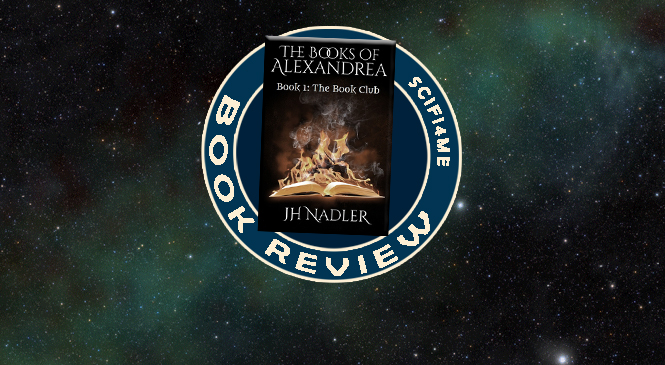Book Review: J.H. Nadler Throws a Pretty Good BOOK CLUB At Us

 The Books of Alexandrea Book 1: The Book Club
The Books of Alexandrea Book 1: The Book Club
Written by J.H. Nadler
Published by WorkingCat, Inc.
September 27, 2021
Paperback, 338 pages
In the interest of full disclosure, I should share that J.H. Nadler and his wife Laura have both contributed to SciFi4Me in the past with their coverage of various festivals and screening events in the New York area.
Having gotten that out of the way, I can say that Nadler’s debut novel is a pretty good yarn.
The basic premise: there’s magic in the world, and throughout history, the power to wield magic rested with women, until men decided that women were too emotional and the magic needed to be restrained by putting it all into books. Now, as I got further into the story, this particular plot element struck me as being… problematic, let’s say? Because when you paint with such a broad brush, you run the risk of alienating the reader. More on this point in a bit.
Alexandrea is our fish out of water, unable to hear or experience magic, and yet she’s the center of the efforts both sides are taking in order to gain control over it. It’s not quite a “chosen one” scenario, but it has pieces of that combined with a “hero’s journey” where Alex has to learn about not only her heritage, but the lengths to which factions will go to control her in order to ultimately control magic. And like every coming of age story, there’s also the requisite amount of pain that comes with the loss of innocence. To quote the Dread Pirate Roberts, “Life is pain.”
The story is told completely from Alex’s point of view, which means there’s no omnipotent narrator and we discover things as she does. From her wanderings with her twin cousins to the first time she learns about her family history, everything is a revelation, and some details are more welcome than others, as far as Alex is concerned. Without getting too deep into spoiler territory, Alex has experiences that change her from a naïve teenager to a more self-assured young woman through the efforts of the Book Club, a coven of witches organized by Alex’s aunt Heather. Although it makes sense within the context of the story, it strikes me that everyone starts looking to Alex for leadership a little too quickly, which leans into the “Chosen One” elements but does it at the expense of Aunt Heather’s character arc.
The Book Club certainly has its mix of personalities as well, the standout being Abby, who’s the only one of the group that can’t really access magic. She’s dedicated to protecting Alex, and her personality is such that I can see her driving a truck or tending a biker bar. Rough around the edges, but deep down caring about everyone around her. If Alien‘s Ellen Ripley was a sidekick, I imagine she’d be a lot like Abby.
The idea that women owned magic once upon a time pretty much tracks with the idea that most fantasy stories have an audience that skews female, with the more emotional and romanticized stories. I expect the same to be the case with The Book Club, and that’s where I get to my one main critique: none of the men in the story have any redeeming qualities. They’re all driven by motivations that come at the expense of the women in the story, and it’s that underlying misandry that almost but not quite pushed me out of several scenes. The only male character who escapes this — although not entirely — is young cousin Billy, who becomes more than what he seems the longer you get into the book. Even Alex’s father has questionable methods when it comes to fulfilling a plan with regard to Alex and her destiny.
Matthew, the main villain of the piece, is appropriately malevolent, and for some reason I pictured Angus Scrimm’s Tall Man from Phantasm II when he shows up in the book. His actions are driven by his belief that he’s saving the world, saving magic, by constraining it to various books collecting spells and incantations. But the methods he employs to capture those spells are enough to turn your stomach if you think about it long enough. Which is, I guess, the point of his character. Even if he’s right, he’s wrong in the way he goes about achieving his goals.
The only other quibble I have is with the first chapter, as it was difficult to tell who was where. The geography of the location — Alex’s childhood home — felt a little bigger on the inside. But past that, I had no trouble following the action.
Complaints aside, overall the characters are pretty well fleshed out, and as Alex encounters her journey, she acquires layers that build her maturity levels in a way that’s both consistent with the narrative and doesn’t build her up as a “Mary Sue” type that suddenly has all of the answers and all the power at the end. Because she doesn’t, and The Book Club is clearly setting up a bigger conflict to come in the remainder of the trilogy.
One twist on a trope that I appreciated: the idea that twins have some kind of special ascendency in fantasy is a trope that dates back to early mythologies from around the world, and it’s good to see it turned slightly on its ear here. The importance of twins comes into play, but not in the way you might think, and I found it a clever use of the trope without diving into the more well-worn aspects of it.
The story is paced just right; not too rushed, not drawn out. It flows with the needs of the scene, so it doesn’t feel like Nadler put a clock or a page count to when a certain thing has to happen. When the story needs are there, the pace gets deliberate without getting bogged down, and that can sometimes be a tricky thing to navigate and keep the reader’s attention. Nadler does that pretty fluidly here.
I quite enjoyed The Book Club. The character arcs, the mix of personalities, and the narrative are all fresh takes on familiar elements. Each chapter leads into the next with the right amount of “tune in next week” tension that you get from the old movie serials. The story flows well, and I found myself reading through this rather quickly once I got a few chapters in. I’m looking forward to reading the next installment, The Between, which implies where we’re going next, given the context. And that should prove to be a suitably dark Act II in the trilogy.
![]()




